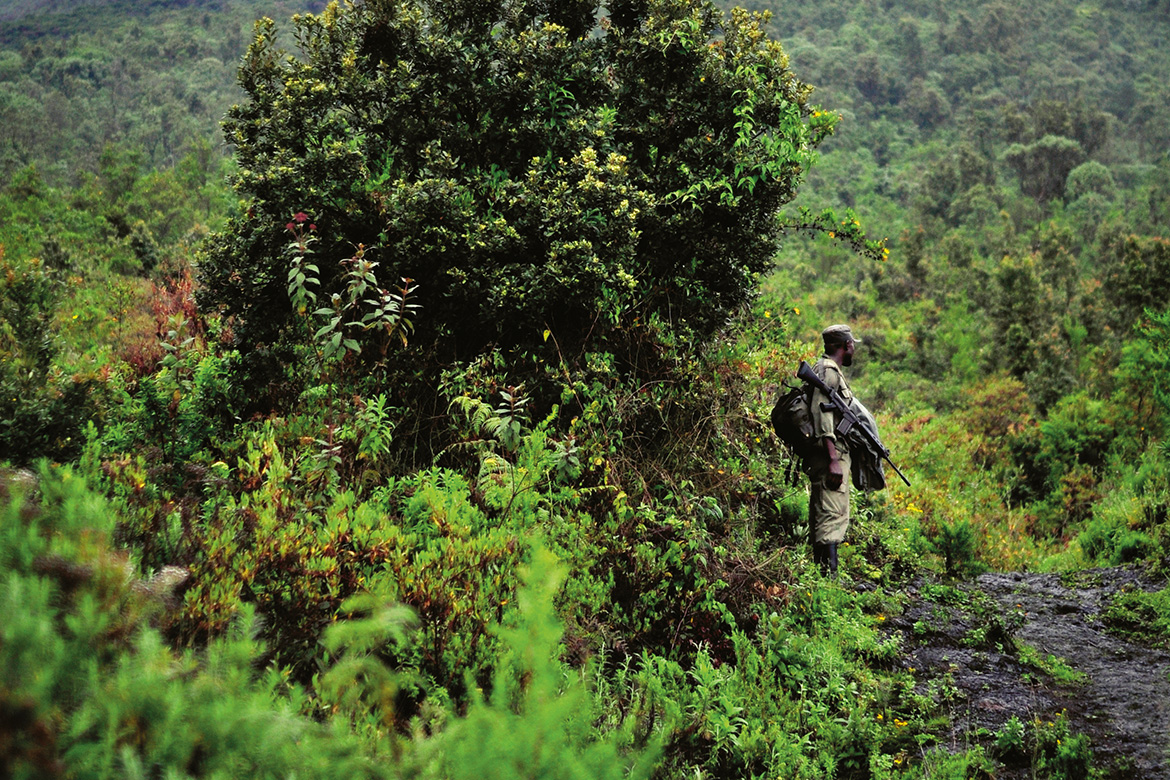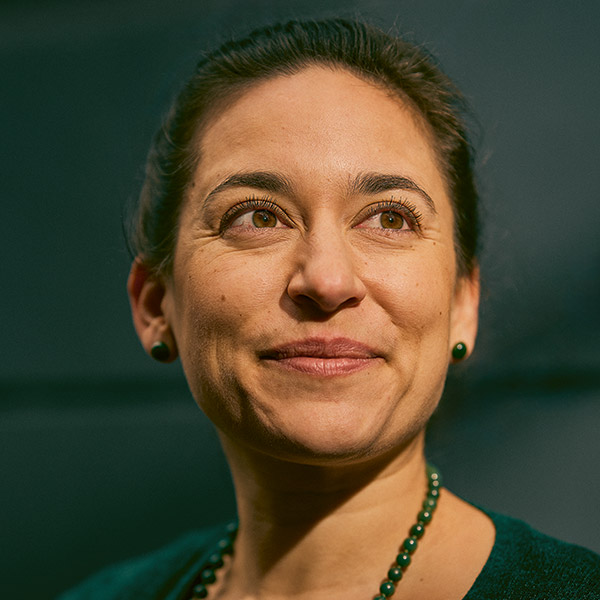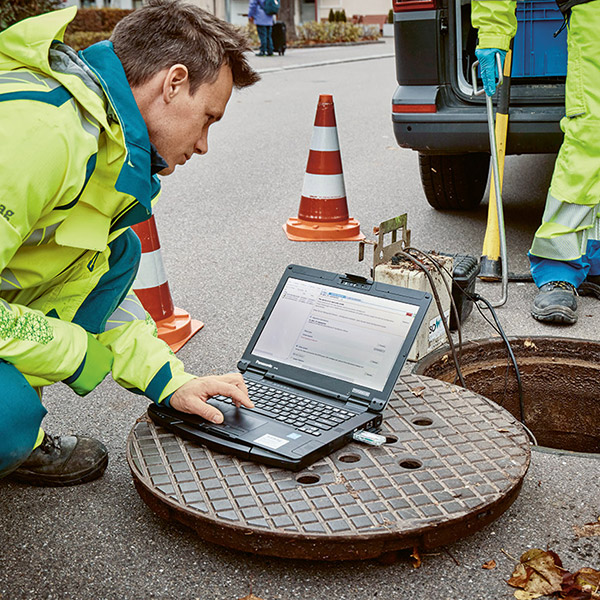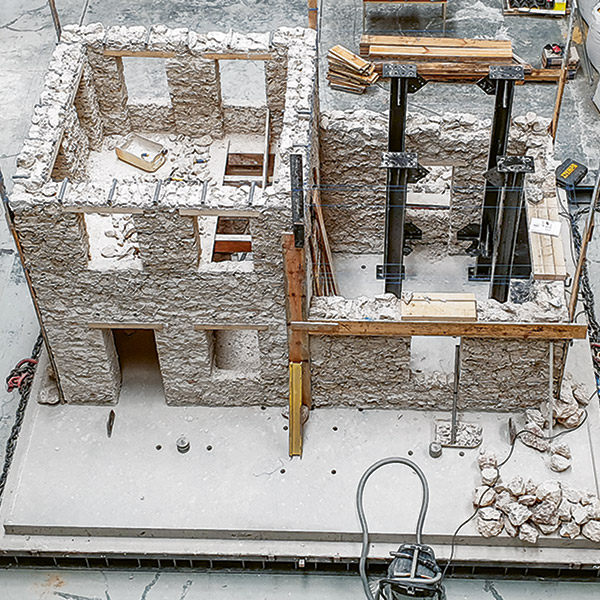Feature: Research in crisis zones
Conflicted peace researchers
Researching for peace is a dangerous business, both for researchers and their informants. Is conflict research really worth the human cost?

Matti Barthel of ETH Zurich here managed a perfect shot. He was collecting soil samples in the Virunga National Park in Democratic Republic of the Congo. At the same time, park wardens were engaged in a fight against rebels and poachers. | Image: Matti Barthel/ETH Zurich
Syria, Yemen, Ukraine – reports of deaths in these conflicts are an everyday item on the news. But these regions are by no means alone in being at war today. In 2018 there was a total of 372 conflicts ongoing across the world, of which 213 were violent. These statistics have been provided by the Heidelberg Institute for International Conflict Research, and alone are proof enough of the importance of academic research into peace and conflict. Researchers in this field endeavour to determine the basic patterns, causes and dynamics of conflict so as to help prevent them in future, or at least to mitigate their impact.
Whoever wants to conduct a quantitative analysis of conflicts can do much of the work at their desk – by analysing newspaper articles, online portals or satellite images, for example. But conducting field research in the affected regions is just as important. Oliver Jütersonke is based at the Centre on Conflict, Development & Peacebuilding at the Graduate Institute in Geneva, and he believes that research on the spot is crucial if you want to understand the position of individuals in insecure regions. “If you’re based far away, you simply can’t properly comprehend how the locals experienced everyday life under ISIS in northern Iraq”.
But field research in areas riven by violent conflict is demanding because it’s often not easy to get access to the people you need to interview. “It’s very difficult to carry out large-scale surveys”, says Jütersonke, who used to do research into urban violence for the World Bank in Timor-Leste. “In certain areas, people we approached were often unwilling to offer any detailed information”.
Research as a disruptive factor
What’s more, field research in conflict areas raises a series of ethical problems. It is possible that researchers can put their interview partners in physical or mental danger simply by consulting them. This makes the researchers part of the problem. “Field work is an ethical and political minefield”, says Rahel Kunz, who teaches at the University of Lausanne. She has experience of research into different post-conflict situations, and has worked on an SNSF research project into equality issues in Liberia and Nepal.
There is a general problem faced by social scientists. By inhabiting the social structures of a region in order to carry out on-the-spot research, they themselves can become participants. Their sheer presence means they alter the very object of their research. Reflecting on this situation is one of the fundamental aspects of empirical social research, but research in conflict regions nevertheless remains extraordinarily problematical. It can also rapidly become an existential problem. People who are interviewed for a research project can afterwards become a target for punishment, while women who offer up information about domestic violence can put themselves at risk of experiencing even more of it. What’s more, people living in conflict areas are often traumatised, so by participating in a research project, they run the risk of re-traumatisation.
It is also difficult to maintain scholarly objectivity when researching in conflict areas. Researchers may take pity on the people they are interviewing, or become angry. And sometimes they can be instrumentalised by one or the other side in a conflict. Jütersonke experienced this in Madagascar: “If you enter a country marked by conflict and become friends with specific people, you might get pushed into a specific corner, politically speaking”. That means you’re no longer seen as independent and neutral, but as being allied to one particular party. And that in turn naturally affects the behaviour of the people you are trying to interview.
Do no harm
All these challenges mean that researchers have to keep adapting to the local context and proceed in a manner that is sensitive to the dispute in question. They need to be aware of the different conflicting interests involved, and of any specific local circumstances. They also have to take into consideration how all this might have an impact on their research activities. “The overarching principle that has to be applied by researchers in a conflict zone is: Do no harm”, says Lars-Erik Cederman. At ETH Zurich, he is researching into the connections between structural inequalities and violent conflict, and was awarded the Marcel Benoist Prize in 2018.
In order to develop such a conflict-sensitive approach, it’s very important to establish local partnerships with scientists, scholars, NGOs and other stakeholders. “Local research partners help provide us with access to people we need to interview. They help us with matters of translation where necessary – both linguistic and cultural – and they enable us to establish a long-term commitment to a place”, says Kunz.
The difficulty in measuring success
Given all these methodological and ethical challenges and the great risks involved, is it really worth researching in conflict zones? What is the concrete use of peace research in today’s political reality? In fact, there are different ways of transferring the results of this research into practice. Researchers can endeavour to influence political decision-makers by presenting their empirical findings. They can also sit on international expert commissions for conflict resolution, or engage in public relations activities to try and stimulate discussion among the general public.
Whether or not peace research can truly prevent conflict and make the world a more peaceful place is difficult to ascertain, because violent conflicts have a complicated dynamic, and we just don’t have enough data. “In most cases it’s almost impossible to measure just how much our research really influences peace and conflict processes”, says Cederman.
But Cederman also says that academic conflict research rarely has a direct impact on the actions of political decision-makers. “Nevertheless, it helps to influence the debate about the measures that states and organisations can take”. Especially in an era of fake news, it’s extremely important to have evidence-based decision-making. We have to base our decisions on real facts about the trends and causes of conflict. Laurent Goetschel is of a similar opinion. He’s the director of the research institute Swisspeace: “If we can generate findings with implementation potential, and if we can ensure that a topic reaches the negotiation stage and that the right actors are seated at the table, then we’ve already achieved a lot”. For example, Swisspeace is supporting civil society in Syria in getting their voices heard and in making a contribution to the peace process. “We also want to show those involved in conflict that there are other ways of solving things, apart from violence”.
After the end of the Cold War, new types of conflict came into the foreground. Inner-state conflicts, terrorism and guerrilla warfare became increasingly prominent focuses of investigation. Questions about the causes of conflict are now analysed independently of the old East-West ideologies, and the discipline also looks at minorities’ problems and climate issues.




